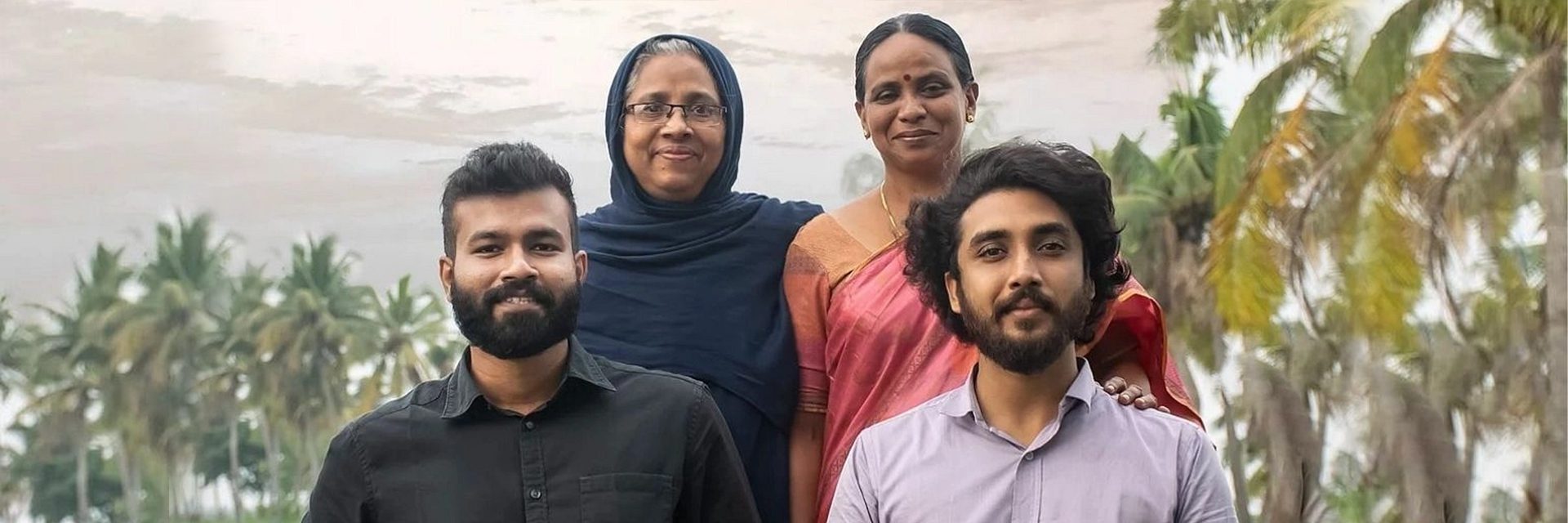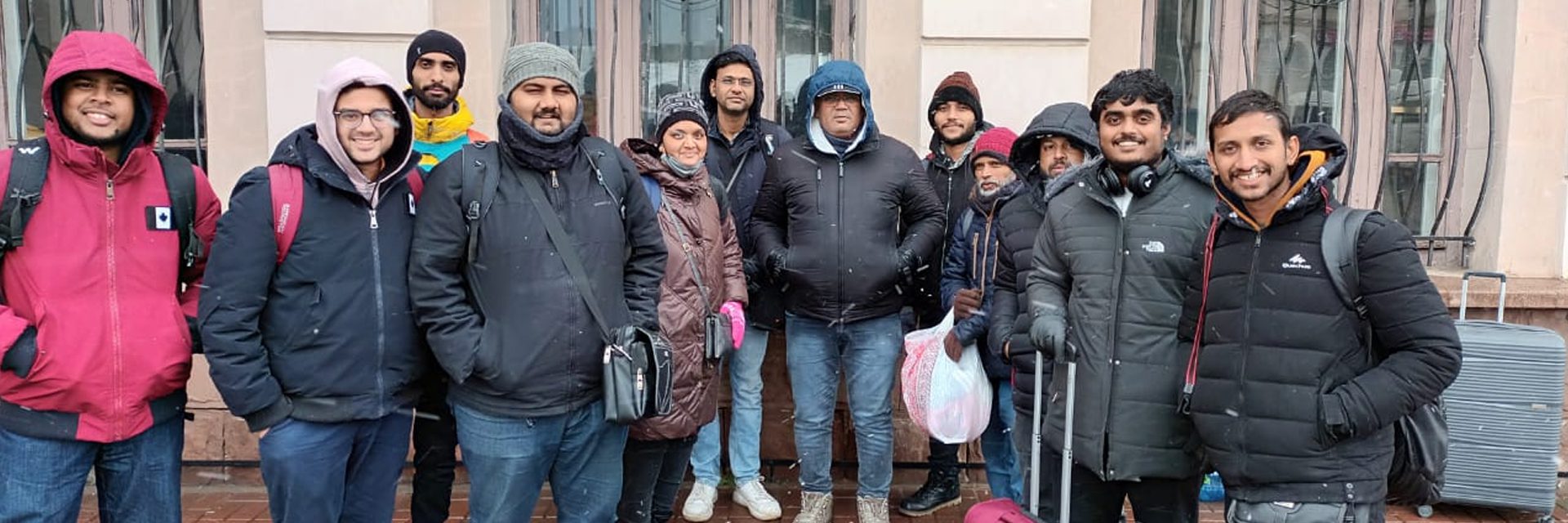(March 19, 2022) The smell of spices roasting, Kishore Kumar hits blaring from a speaker, the air thick with laughter – Asma Khan’s Supper Clubs started small in early 90s London but grew bigger every week. A talent for putting together Kolkata Mughlai and Hyderabadi spreads had opened the doors to a new life – a much-needed opportunity for a young woman who had put the familiar thousands of miles behind. “More than just the act of cooking, I enjoy feeding people,” smiles Asma during an interview with Global Indian. “I knew I could do something with food, so I opted for the easiest and cheapest – Hosting supper clubs in my own house,” she adds. The London-based chef runs Darjeeling Express, one of that London’s most sought-after dining rooms. Since it began in 2017, celebrities like Nigella Lawson, actor Keira Knightley, Dan Levy (the creator of Schitt’s Creek), Anil Kapoor and his daughter Sonam and Paul Rudd have visited for the “pani puri, prawn malai curry, Hyderabadi thali, chicken kaati rolls and Kolkata biryani, all of which guests love.
Famous chefs are synonymous with famed schools and restaurants, celebrity mentors, and a tally of Michelin stars. Asma Khan boasts none of these. With no formal training, the London-based chef, restaurateur and author has carved herself a niche at London’s culinary high table. Apart from its popularity, Darjeeling Express’ biryani supper clubs are eagerly awaited. Asma Khan’s stock only rose when she became the first British chef to feature in Netflix’s Emmy nominated Chef’s Table. On March 17, 2022, she unveiled her second book, Ammu, dedicated to her mother, bringing recipes from her family kitchen to yours.

Asma Khan. Photo by Urszula Sołtys
Back to the beginning
Her five years in the restaurant business have been marked by a meteoric rise to fame but was preceded, as most success stories are, by a long, sometimes arduous journey. In 1991, “a family member introduced me to my future husband,” she says. Three months later, the couple decided to marry. When she arrived in England, Asma had barely cooked in her life. Stepping off the plane, her first experience of a foreign land was the biting cold of an unforgiving winter.
With her friends and family back home in India, sheer boredom compelled Asma to try her hand in the kitchen. Back home in India, the history honours student from Loreto College had been all set for what looked like a career in writing. The La Martiniere alumna began with a stint as a copywriter in Lintas, then joined Anand Bazar Patrika’s Sunday magazine as a sub-editor, working with columnist Vir Sanghvi.
“When I started cooking, I started feeling happy and satisfied. Feeding others was a bonus,” she adds. She mostly stuck to a mix of Kolkata Mughlai and Hyderabadi cuisine. In 1996, she decided to return to studies and studied law.
View this post on Instagram
With a little help from her friends
Her love for cooking brought one more opportunity – to make new friends. As her home was beside a school, Asma became friends with a group of Indian nannies awaiting their wards. They would come home, where Asma cooked for them.
What started out as a group of 14 grew bigger each passing week, with her nanny friends helping out in the kitchen. “I had mostly women guests from diverse backgrounds but slowly, through word-of-mouth, it became more of a cosmopolitan crowd, with women bringing their partners as well,” Asma explains. As the demand continued to grow, so did Asma’s team of home chefs.
Pop-ups and English pubs
Asma’s two young sons were overwhelmed by the Supper Club gatherings and the constant noise. That led her to her coveted space at Covent Garden, after trying a hand at pop-ups.
In 2015, Asma collaborated with a Soho pub to serve food there. The journey was tough, Asma admits. There were days when her fare had no takers and on others, they ran out of food. Sometimes, she offered free samosas to attract crowds. One day, however, “A man said, ‘Oh no, I don’t like your curry, love,’ I felt terrible but I wasn’t ready to give up. I knew my food was good and was confident that things would change.”

Photo by Urszula Sołtys
A food critic and a change
Fay Maschler, the restaurant critic of London’s Evening Standard decided to try her food. It was unexpected, as temporary setups like pop-ups and supper clubs don’t usually get reviewed. “She liked the food and wrote the review. Overnight, we had a massive queue of people,” Asma smiles.
One thing led to another and in 2017, Asma decided it was time to open Darjeeling Express at Garrick Street in Covent Garden. Why the name? “Darjeeling takes me back to my childhood. The toy train ride from New Jalpaiguri to Darjeeling reminded me of my childhood days when we escaped to the hills far away from Kolkata heat,” she says.
No shortcuts to success
The all-female staff who ran the restaurant came with no formal training. “We learned everything the hard way,” the London-based chef remarks. But she had her loyal guests from the supper clubs and her pop-up days. Soon, the restaurant was the go-to for authentic Indian food.
Her restaurant, she says, is about home food cooked by women. It’s her way of celebrating the, “heroes of the sub-continent. They are the housewives, the mothers and the household help. The identity of women is so overshadowed.”
When Netflix came calling
Asma is the first British chef to be featured on Chef’s Table. This was the big league, she knew and she used it as a platform to raise a voice of solidarity for South Asian women. “I wanted to showcase our home cooks for we are collectively uncelebrated. Every household in India, Pakistan, Bangladesh and Sri Lanka has women in the kitchens, even if men dominate the restaurant business,” says Asma.
She presented Netflix, therefore, with one condition: That her team is present also. “Darjeeling Express and its journey is not about me alone,” she insisted. Netflix agreed and soon, the world learned Asma’s name and became acquainted with her team of women from India and Nepal. The episode went on to an Emmy nomination and Darjeeling Express was nominated for a James Beard Award in 2020.
View this post on Instagram
The pandemic
The year 2020 was fateful for restaurant businesses and for Darjeeling Express too. “We had to close down but didn’t give up,” Asma says. Instead, the kitchen’s female warriors began a home delivery service. Her second book, Ammu, written for her mother began. It comprises 100 recipes that she used to have as a child and what she was cooking for her sons in London. “Since I couldn’t travel due to Covid-19, and I had complete silence around me, I could write the book. It is all about learning about spices, flavours and how to cook with love and patience,” she says. Food, she feels, is all about story-telling and the book does that.
In 2018, Asma made her literary debut with a cookbook titled Asma’s Indian Kitchen. It won the Gourmand World Cookbook Award in the Indian cuisine category in the UK, and was shortlisted for best debut cookbook for the Fortnum & Mason 2019 Awards.
View this post on Instagram
Between Bollywood and the BBC
Her love for Bollywood music will never fade away, with Kishore Kumar and Hemant Kumar remaining her favourites. Asma also enjoys writing poetry and is a regular at BBC Radio where she and a team analyse political news every Sunday morning.
Though she has a busy schedule, Asma was in Kolkata last year to shoot for Yes Chef, an online show that features the world’s best chefs taking exclusive cooking classes for the home cook. She shared her favourite recipes, and enthused in yet another chance of storytelling through cuisine.
- Follow Asma on Instagram
Also Read: King Cannes: Chef Manu Chandra shines at top film festival



